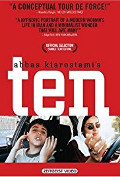
Directed by
Abbas Kiarostami
94 minutes
Rated PG
Reviewed by
Ruth Williams


Ten
Synopsis: An Iranian woman (Mania Akbari) is driving around the streets of Tehran. As she drives, a camera mounted on the dashboard records ten conversations she has with a number of passengers she picks up and drops off over a forty-eight hour period. As the conversations unfold, the plight of the modern Iranian woman is revealed through intimate dialogue and the silences in between.Ten is a deceptively simple film. A student in one of Kiarostami’s film workshops declared that if he had made this film, no one would be interested in it. Kiarostami replied “making something simple requires a great deal of experience.” Just as every second person will claim that they could have painted Blue Poles, there will be those who may dismiss this film for the similar reasons. As a viewing audience, so much of what is on offer at the cinema is designed to get our adrenalin pumping. Here we are invited to sit in the backseat and hand the control over to the driver.
Kiarostami has elected to blend fiction with fact in order to achieve his desired outcome, just as Michael Winterbottom has done in his latest film, In This World. The actors in these two films could have walked off any street in Tehran or Pakistan. Both directors offer direction, but only to the point where their vision is established. From that point, they hand over to their ‘actors’ to represent both the personal and the political nature of their situation. Kiarostami is more interested in the reaction of the audience to the film rather than whether he is acclaimed as the director.
So we watch and listen. As the driver attempts to defend her reason for leaving Amin’s father, we could be watching any mother and son in the developed world. The black and white view of the child cannot accept that life could be experienced in shades of grey. Just as the universal nature of her experiences touch us, in the next breath it is clear any freedom is hard won. The fact that she has to accuse her husband of taking drugs so she can file for divorce soon places her squarely in a country that does not accord women equal status.
It is thanks to filmmakers like Kiarostami that the expectations of audiences around the world are broadened. When American films dominate our cinemas, we start to see the world through American eyes. In Ten, a woman talks to her sister, her son, an elderly woman, a prostitute, and suddenly we see ourselves in her everyday concerns. Kiarostami has declared that it is in this way that cinema is the true universal language. We may not understand Farsi, the language spoken in the film, but we certainly understand love, heartache, loss and a hope for a better future
Want something different?





